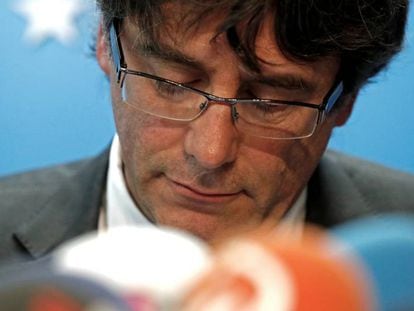Former Catalan premier, ministers due in Belgian court on November 17
A judge will decide on their arrest and extradition to Spain, but the decision could be still appealed

Ousted Catalan premier Carles Puigdemont and four ex-ministers are scheduled to appear before a Belgian judge on November 17 at 2pm, at a hearing to decide on their arrest and possible extradition to Spain, according to Agence France Presse (AFP).
All five former Catalan officials – Puigdemont and Antoni Comín, Clara Ponsatí, Lluís Puig and Meritxell Serret – turned themselves in to the Belgian police on Sunday after a Spanish judge issued a European arrest warrant for them. They were later granted conditional release.
The former members of the Catalan government are accused of rebellion, sedition, misuse of funds and disobedience
Even if the Belgian justice system ultimately decides to send the five back to Spain, where they are wanted on charges of rebellion, sedition and misusing public funds in connection with their unconstitutional secession bid, there will still be room for appeals.
The EU arrest warrant system establishes a maximum period of 60 days to resolve extradition requests between member states, but this deadline may be extended 30 more days in exceptional cases.
Puigdemont has secured the services of a lawyer named Paul Bekaert, an asylum specialist with past experience helping members of the Basque terrorist group ETA fight extradition requests by Spain.
Puigdemont and the four ex-ministers turned themselves in at a police station in Brussels early Sunday morning, and made statements during the evening and into the night in the city’s public prosecutors’ building. At around midnight, the judge announced that there was no reason to keep them in custody while their handover to Spain was being decided.
The Catalan Socialist Party (PSC) said that the Belgian judge’s decision to grant conditional release to Puigdemont and his colleagues on Sunday was “more proportional” than a Spanish judge’s decision to hold several other former Catalan officials in pre-trial custody in Madrid.
Salvador Illa, of the PSC, added that his party “respects all legal decisions whether they are made in Madrid or Brussels,” the EFE news agency reported.
On Friday, the Spanish judge in charge of the investigative stage of the case, Carmen Lamela of the High Court, issued an international arrest warrant for the five former members of the Catalan government, turning what had been a Spanish affair into an international one.
Aware that they could be facing imminent arrest, the five decided to turn themselves in to the Belgian Federal Police.
“In cases that get a lot of media attention and when we know where the person is, sometimes it is not necessary to deploy a show of force if they are willing to hand themselves in,” the prosecutor explained.
Media presence
Puigdemont is ramping up his media appearances in an effort to internationalize the Catalan conflict and build up support for a cause that has so far attracted little enthusiasm from foreign governments.
Writing in The Guardian on Monday, Puigdemont denounced “the mass imprisonment and criminalization of candidates promoting political ideas that, just two years ago, obtained historically high levels of public support.” He claims to represent a democratic government with “a clear majority in favor of Catalan independence: 72 seats out of 135” (failing to mention that these 72 seats in fact represent under 48% of the vote at the 2015 elections).
Meanwhile, in Spain, eight former members of the Catalan government – including the ex-deputy premier, Oriol Junqueras, remain in pre-trial custody in jails in the Madrid region. Judge Carmen Lamela decided that the politicians – all of whom are facing similar charges to Puigdemont and the four ex-ministers currently in Brussels – presented a flight risk and ordered their detention late last week.
English version by Susana Urra and Simon Hunter.
Reactions in Belgium
The Catalan independence crisis has spilled over to Belgian politics, showcasing the divisions within a fragile coalition made up of the French-speaking liberal MR party and three parties from Dutch-speaking Flanders, including the separatist New Flemish Alliance (N-VA).
Despite entreaties by Belgium’s prime minister, Charles Michel, to avoid discussing the Catalan conflict in public, his own interior minister has already lashed out against Madrid.
“The Spanish government will be acting in place of a democratically elected government whose members have been jailed... what did they do wrong? They simply applied their voters’ mandate,” said Jan Jambon, a Flemish nationalist, obviating the fact that Catalan secessionists violated the Spanish Constitution.
Another Belgian politician, Guy Verhofstadt, who is the leader of the Alliance of Liberals and Democrats for Europe Group inside the EU Parliament, also questioned the actions of the Spanish justice system.
"We must ask ourselves whether imprisonment is not disproportionate. Is there no other way to ensure that these separatist leaders get a fair trial?" said Verhofstadt, who delivered an impassioned speech about the Catalan crisis inside the European parliament shortly after the illegal referendum of October 1.












































